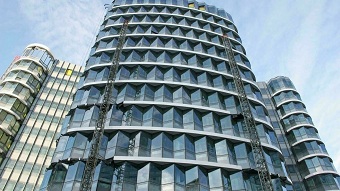French finance minister Bruno Le Maire has inaugurated a new cyber campus near Paris’ La Défense business district. The centre brings together specialists from the public and private sector in an effort to develop new security and to defend France and French business from cyber attacks.
Designed by Christian de Portzamparc, the 13-storey ‘Campus Cyber’ in La Défense will be home to 1,700 people with backgrounds in the military, as well as industry and public administration who will share their expertise in a joint effort to fight cyber crime.
The campus is part of President Emmanuel Macron’s cyber security initiative that will cost €1 billion, including €720 million of public money. The plan was unveiled 12 months ago.
By mixing secret service agents, with police, health workers and engineers from companies such as Orange and Thalès, Macron is hoping the campus will provide a hub for new ideas.
The ANSSI, a government agency for IT security, will occupy one floor of the new campus and will host a number of training programmes, while other government and private bodies will have offices and meeting rooms in the rest of the building. The director of the campus is a former CEO of Orange cyber defence, Michel Van Den Berghe, who was recruited by Macron to lead the project.
By working in collaboration against cyber attacks, instead of each service operating separately, the French government is hoping to make up for lost time. The French model follows in the footsteps of countries like Russia with its ‘Skolkovo’ campus, founded 12 years ago, and Israel’s CyberSpark, started 8 years ago and run by the military.
According to Cesin, an organisation made up of IT security heads, 25 percent of French companies were affected by ransomware in 2020.”We’re never safe from an attack, but we can be prepared,” Marc Boget, a commander in the gendarmerie in charge of cyber security at the Campus Cyber told France Info. “Every 11 seconds there is a ransomware attack somewhere in the world,” he says, adding that today there are 7,500 people working to provide cyber security in France. With the campus, that number will be 10,000 by 2023.
“We’ve noted a multiplication by nine in the number of attacks against the Winter Olympics in Beijing, and we’re expecting a similar situation in Paris in 2024. We’re getting ready to block them”.
In 2021, cyber attacks paralysed the hospitals of Dax and Villefranche-sur-Saône to such an extent that health workers had to go back to using pen and paper. The government is hoping to triple the revenue in the cyber security sector to €25 billion in the coming years, double the number of jobs and produce at least three new “unicorns” (companies worth one billion dollars).








